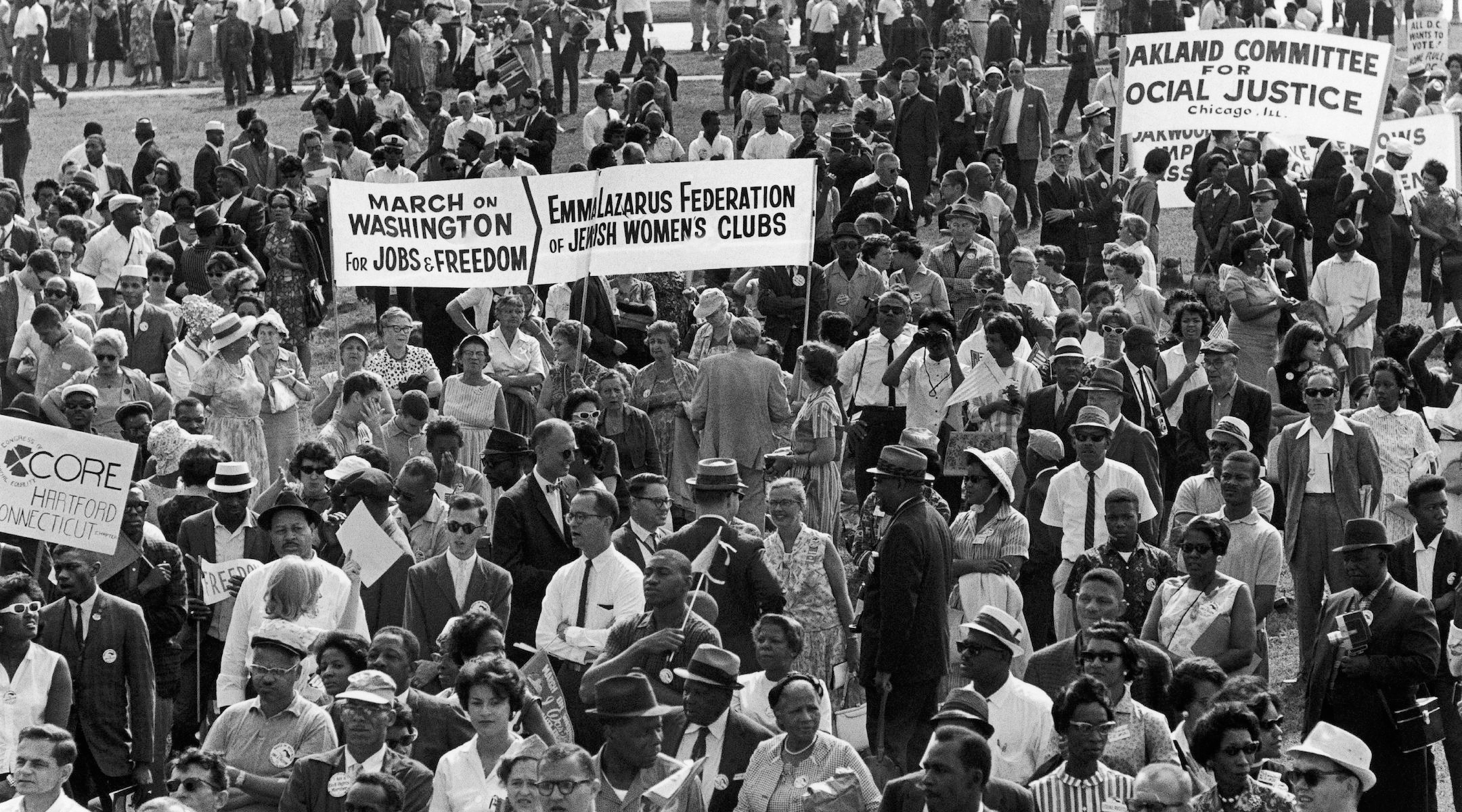How Jews are joining the 60th anniversary of the March on Washington on Shabbat
The roster’s Jewish speakers include rabbis, activists and representatives of Jewish organizations, including Jews of color

A Jewish banner at the 1963 March on Washington. (Keystone-France/Gamma-Keystone via Getty Images)
(JTA) — Six decades ago, shortly before Martin Luther King, Jr., delivered his iconic “I Have a Dream” speech on the steps of the Lincoln Memorial, Rabbi Joachim Prinz called for racial equality in an address that began with the words, “I speak to you as an American Jew.”
This Saturday, about a dozen Jews will be in the lineup of more than 100 speakers who will return to the memorial’s marble steps for what is being billed as a continuation of the March on Washington for Jobs and Freedom on its 60th anniversary. Alongside the anniversary march, which will take place on Shabbat, an initiative is launching to encourage discussion at Friday night dinners about fighting racism and antisemitism.
The event is being organized by activist groups helmed by King’s son, Martin Luther King III; Rev. Al Sharpton; and other civil rights leaders, and is expected to draw 75,000 people, according to the Washington Post. The 1963 march drew more than 200,000 people.
The roster’s Jewish speakers include rabbis, activists and representatives of Jewish organizations, including Jews of color. Yolanda Savage-Narva, who serves as the Union for Reform Judaism’s assistant vice president for racial equity, diversity, and inclusion, told the Jewish Telegraphic Agency that the participation of Jews of color indicates that “our country has made progress.”
“Our community understands that people of all backgrounds can come from different faiths, and the fact that there are Jews of color on the podium of the March on Washington speaks to the fact that we’re intersectional beings,” said Savage-Narva, who is Black and Jewish. “We’re not just one thing, we’re not just our racial identity, our gender identity, our religious background, and it gives people an opportunity to see a whole person.”
Savage-Narva said she will be speaking briefly and will deliver the message that people should “be proximate to one another, build relationships so we have more capacity to hear each other’s stories, and see each other b’tzelem elohim, in God’s image. We are all God’s children.”
The 1963 march came during the campaign for the Civil Rights Act, which was passed the next year. At Saturday’s march, King III, a leader of a group called the Drum Major Institute that aims to continue his father’s legacy, will call for strengthened voting rights as well as other measures to protect American democracy, according to the Washington Post.
“It feels like we’ve gone backwards in relationship to civil and human rights. Dad talked about eradicating the triple evils of poverty, racism and violence,” King III told the Post. “So we have to be more vigilant, we have to be more engaged, we have to be more, in fact we are, more determined than ever to actually address these great issues.”
One of the march’s co-chairs is the Anti-Defamation League, and the Jewish civil rights group’s CEO, Jonathan Greenblatt, will be speaking as well. He noted that ADL leaders were at the original march as well, “when standing next to Dr. King wasn’t necessarily easy” because of controversy over civil rights.
“This is a march that’s not just about equality for Black people or just about fighting hate against Jewish people,” he said. “This is about standing up for all people.”
Greenblatt added that he hopes to encourage cooperation between Black and Jewish leaders. “It will be more specifically focused on the need for the Black and Jewish communities to work together and not allow those with ulterior motives to divide us, but instead to focus on the shared experiences and common values that we share with one another.”
In its programming surrounding the Saturday march, the ADL is marking Shabbat while launching an initiative that it hopes will strengthen Black-Jewish ties.
On Friday night, it will be hosting a Shabbat dinner featuring author Michael Twitty, whose memoir “Koshersoul” charts his work fusing African-American and Jewish culinary histories. It has also reserved hotel rooms within walking distance to the march for participants who don’t drive on Shabbat, and Greenblatt said there will be a morning prayer service before the program begins.
The ADL, the National Urban League and OneTable, which facilitates Shabbat dinners, have also partnered on a new initiative urging people to convene Shabbat dinners to reflect on the March on Washington and on fighting racism and antisemitism. A pamphlet meant to be a guide for the Shabbat dinners includes essays by Jews of color and suggested action items.
“Shabbat is a time of rest and replenishment for Jews, and a way to activate and to be in community, to have other people understand how important a moment like this is,” Savage-Narva said. “Even though it is Shabbat, it’s a sacrifice of sorts to say, ‘Hineni,’ I am here, I’m showing up and this is so important for me and the multiple identities I hold.”
This article originally appeared on JTA.org.














